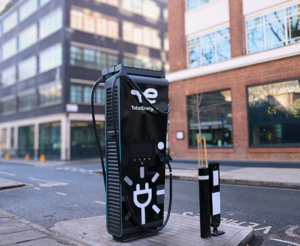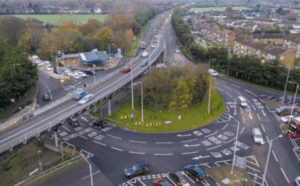TfL wants to highlight the vulnerability of powered two-wheel vehicle users, as demand for them has surged throughout the pandemic”Every death or injury on our roads is one too many, and as motorcycle journeys increase, it’s vital riders are accessing the proper training to keep themselves and other road users safe”Heidi AlexanderDeputy Mayor for Transport
TfL and the police are encouraging road users to watch out for each other in a new advertising campaign during Global Road Safety Week, following a worrying number of young men being tragically killed or seriously injured in motorcycle collisions.
People riding motorcycles face the greatest likelihood of death or serious injury of anyone driving on the roads. Provisional data for 2020 shows that 31 people in London were tragically killed in a collision involving a power two-wheel (PTW) vehicle, such as a motorcycle, moped or scooter and 12 of these collisions are believed to involve no other vehicle.
Sadly a person walking and a person cycling also died in collisions in 2020 involving a PTW vehicle, and more than 730 riders were seriously injured*, said TfL.
As PTW drivers are statistically the most vulnerable drivers on London’s streets, TfL is asking all road users to watch out for each other to eliminate people being killed or seriously injured in collisions involving these vehicles.
A series of motorcycle safety videos and a radio advertisement have been produced as part of the safety campaign, featuring road safety advocate Ogmios, who is known for his dash-cam voiceovers on YouTube.
Over the course of the pandemic the number of home deliveries has soared, which has led in part to the number of PTW vehicles on London’s streets increasing dramatically. Data from the Motorcycle Industry Association (MCIA) shows that registrations for low powered scooters in London have increased by almost a third (31%) between 2019 and 2020.
As the delivery, courier and servicing industries continue to respond to the impacts of pandemic restrictions and Londoners continue to rely on their services, TfL is campaigning for both PTW riders and other drivers to watch out for each other, especially when turning, helping to keep all road users safe.
While just one per cent of journeys in London’s streets are made by PTW vehicles, data shows that in 2019 riders represented more than a quarter (26%) of overall deaths and serious injuries.
TfL data indicates that many collisions involving PTW vehicles occur when a car turns into the path of the rider. It says 65% of the victims of motorcycle collisions that lead to death or serious injuries between 2017 and 2019 were riding low powered scooters (with an engine size up to 125cc) – and data shows that new registrations of these low powered PTW vehicles are on the rise in London.
The great majority of victims are men; nearly half of those killed or seriously injured are young men under 29. Young men are sadly most at risk of being involved in collisions; since 2012 more than 100 male motorcycle riders under the age of 29 have died in London.
Data from the Metropolitan Police Service indicates that these young men are usually riding low-powered scooters which require only require a day’s training and no exam to ride and are most commonly associated with delivery and servicing industries.
Lilli Matson, TfL’s Chief Safety Health and Environment Officer, said: “Young men are tragically losing their lives in avoidable motorcycle collisions, which all too often also injure or kill people walking. We’ve seen a significant rise in motorcycle deliveries over the last year and this cannot come at the expense of safety. This is why we’re working closely with delivery, courier and servicing companies to address safety and protect the lives of riders and everyone else on London’s streets. I hope our motorcycle safety work will help raise awareness amongst all road users that we all need to watch out for each other when travelling around the city.”
Heidi Alexander, Deputy Mayor for Transport, said: “Every death or injury on our roads is one too many, and as motorcycle journeys increase, it’s vital riders are accessing the proper training to keep themselves and other road users safe.
“The huge rise in motorcycle deliveries in the past year means that courier, servicing and delivery companies have an important role to play in helping drive down these tragic incidents, and we continue to work closely with them to help ensure riders watch out for each other and everyone else on the capital’s streets.”
Lembit Öpik, the Motorcycle Action Group’s (MAG) Director of Communications and Public Affairs, said: “MAG fully supports this important work on safety for motorcyle riders and their training initiative, namely the Safer Drive Stay Alive course.
“Given the casualty statistics, it’s timely and hugely relevant. In an imperfect world, everyone makes mistakes, and teaching rather than preaching is a wise way to cut casualties by promoting behaviours that reduce collisions. The Motorcycle Action Group works with TfL as we reach out to delivery and other riders to nurture mindful motorcycling and observant car driving.”
Along with their safety work, TfL is working closely with PTW vehicle rider representative groups, road safety organisations, delivery and courier companies to ensure all avenues and innovations for improving rider safety are explored.
Motorcycle safety awareness will also now feature in the course content for Safe Drive Stay Alive, a young driver safety programme targeted at 16-19 year old school pupils. The Metropolitan Police also deliver Bikesafe and Scootersafe training in London, whereby participants spend a day with the police to learn how to become a safer and more confident rider.
The police also run regular enforcement operations to target dangerous riding and have been using these enforcement stops to talk to riders about safety and visibility. Riders are spoken to about things such as making essential vehicle checks before setting off on a journey, riding within the speed limit and giving themselves enough space and time when overtaking.
The police are also taking enforcement action against other vehicles that cause a risk to riders or other vulnerable road users. With genuine commitment and action by everyone who has a role to play, TfL hopes to move ever closer to Vision Zero – eliminating death and serious injury from collisions on London’s streets.
The Mayor’s Vision Zero Action Plan shows that with safer vehicles, streets, speeds and behaviours, London will become a safer, healthier and greener place for everyone.
TfL’s world-first Direct Vision Standard lorry safety scheme is a central part of this, now in operation 24/7 across all the capital’s roads. In order to operate in London, vehicles over 12 tonnes must have a free DVS permit which assigns a star rating from zero (poor) to five (excellent) based on how much the driver can see directly through their cab windows.
All zero-star vehicles are now banned unless a series of Safe System measures have been installed. This will save lives and improve road safety by reducing lethal HGV blindspots.
In addition, TfL is rolling out 20mph speed limits on TfL roads, encouraging safer driving through campaigns and education programmes and transforming roads and junctions to make it safer for people to walk and cycle.
Through TfL’s Vision Zero work TfL is supporting journalist and road safety campaigner Laura Laker to improve language around reporting on road safety statistics. Her work with the University of Westminster’s Active Travel Academy will seek to improve the way collisions are reported to ensure it is always accurate and fair.
This new guidance for reporters will help represent those involved in collisions better and help steer the language used away from calling collisions ‘accidents’, which suggests an inevitability to these tragic events.
Pic-Sustrans
























